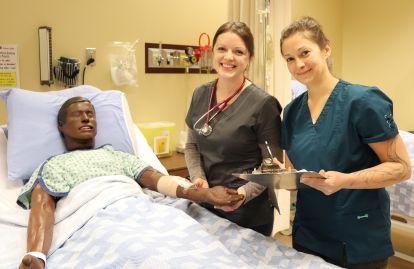
Republished from May 3, 2023
Help is there for you when it’s needed the most, but getting tomorrow’s frontline health care experts prepared for the challenges ahead requires your assistance now.
Students gaining the education, skills and training in Selkirk College’s four-year Bachelor of Science in Nursing (BSN) Program are vital to the region’s health care system. Each year, an average of 25 nurses graduate into the system where most stay in the West Kootenay and Boundary.
An important element of the program is training in the simulation lab using both high-tech mannequins and human volunteers. From one-day training sessions to week-long Sim Camps, students are able to progress knowledge and deepen their understanding.
“This is an opportunity to bridge the gap between theory and practice with experiential learning that is facilitated and supported in a safe learning container,” says BSN Program instructor Chris Hillary. “It gives students the chance to experience a situation with low consequence before they encounter it in real life.”
In order to produce successful learning outcomes, the program’s faculty appeal to members of the community to spend a couple hours in the simulation lab with students. Of particular need is including young children from infant to pre-school age whose caregivers are open to being part of an education that ultimately benefits the entire system.
“In the Kootenays, we have very limited opportunity for our BSN students to have pediatric experiences,” Hillary explains. “So this training may be one of the few opportunities for students to ‘care for’ a pediatric client and their family before they are graduates.”
In a calm and supportive environment that is supervised by instructors, volunteer parents and their children would act as a typical patient. Not much different than a regular visit to the doctor’s office, the student nurses will ask standard health history questions about the children. The students will then perform a basic physical assessment on the pediatric client with a respiratory focus that is minimally invasive and includes vital signs, listening to lung sounds and taking a weight.
Volunteers would be required to spend an hour in the simulation lab on the Castlegar Campus. The call for volunteers goes out several times a year.
“One of the wonderful aspects of this program is the connection we have to our community and this is an example,” says Hillary. “We really appreciate the support we receive from volunteers and those who have taken part in the past have expressed that they enjoyed spending time with these future nurses. Students are grateful for the experience and certainly carry forward their bond with the community into their practice.”
If you are interested in volunteering for an upcoming pediatrics simulation lab or other simulation opportunities in the future, email us!
Learn more about the School of Health & Human Services.
Sustainable Development Goal (SDG) #3: Ensure healthy lives and promote well-being for all at all ages


